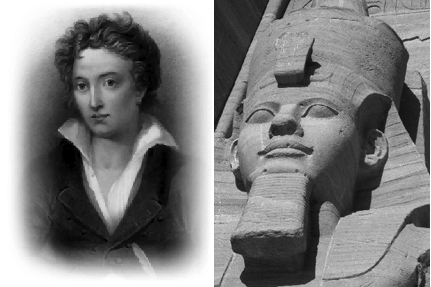
The fall of the dictators still echoes across North Africa and the Arabian Peninsula, with Syria’s Asad teetering at the brink. Mubarak, Qaddafi and Ali Abdullah Salih join the legion of past icons of unchecked power. Pharaohs and kings, caliphs and sultans, whether the divine myth of rule or the blatant Machiavellian Leviathan: oh how the mighty have fallen. No poem seems more poignant to capture the moment that Shelley’s timeless take on Ozymandias:
I met a traveller from an antique land
Who said: “Two vast and trunkless legs of stone
Stand in the desert. Near them on the sand,
Half sunk, a shattered visage lies, whose frown
And wrinkled lip and sneer of cold command
Tell that its sculptor well those passions read
Which yet survive, stamped on these lifeless things,
The hand that mocked them and the heart that fed.
And on the pedestal these words appear:
`My name is Ozymandias, King of Kings:
Look on my works, ye mighty, and despair!’
Nothing beside remains. Round the decay
Of that colossal wreck, boundless and bare,
The lone and level sands stretch far away”.
But the fantasized Ozymandias has a prologue, in Arabic graffiti and belles lettres. The entertaining text, today as ever before, known as The Book of Strangers and attributed to Abu al-Faraj al-Isfahani, reports the handwriting on the wall when the walls come tumbling down. An anecdote related by an old secretary tells of an inscription on the wall of a palace built by the Abbasid caliph al-Mutawakkil:
Money was spent and used up
and buildings were erected for fate to destroy.
When they arrived at the peak of their kingship,
a caravan leader cried out that it was time for the grave,
and he emptied the palaces, giving no respite to either the powerful or the oppressed.
And another graffiti on the fate of those who destroyed the fate of so many others:
This is the abode of kings
who managed the affairs of countries for a time
and who were the chiefs of the Arabs.
Having first obeyed them, time rebelled against them.
See what it has done to the ruined palace of Jawsaq
and Barkuwârâ and al-Mukhtâr,
which have all been emptied
of that glory, power, and rank.
And another wit during the reign of Sayf al-Dawla:
The intelligent man would not even cast a glance at it,
nor would he acquire it as a permanent or enduring home.
Consider and you will see people in the palace
and feel how empty it is,
though it once had glory that rose sky-high.
It is as if government and sovereignty were never here,
only suffering.
I am not sure if it is always true that history repeats itself, but the Ozymandias immortalized by Shelley is alive and dead in every generation.
Excerpts are from The Book of Strangers, edited by Patricia Crone and Shmuel Moreh (Princeton: Marcus Wiener, 2000).
Daniel Martin Varisco